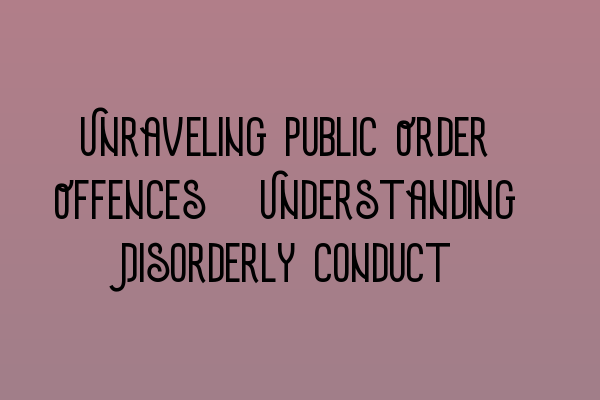Unraveling Public Order Offences: Understanding Disorderly Conduct
Public order offences are a common occurrence in our society. Disorderly conduct, in particular, is one such offence that often leads to disruptions in public spaces. In this article, we will delve into the intricacies of disorderly conduct, its legal implications, and how it is classified under the UK law.
What is Disorderly Conduct?
Disorderly conduct refers to any behavior that disrupts the public order and peace. It can include actions such as fighting in public, using offensive language, causing commotion, or engaging in aggressive behavior.
In the UK, disorderly conduct is categorized as a public order offence under the Public Order Act 1986. This act provides a legal framework to punish those who engage in disorderly conduct and disturb public tranquility.
Legal Implications of Disorderly Conduct
Those found guilty of disorderly conduct may face various legal consequences. The severity of the punishment depends on the specific circumstances of the offence and the individual’s previous criminal record.
First-time offenders may receive a warning or a small fine. However, repeat offenders or those involved in more serious instances of disorderly conduct can face imprisonment, community service, and even a criminal record, which can have lasting negative implications on employment prospects and personal life.
It is essential to consult a qualified criminal solicitor if you are facing charges of disorderly conduct. They can guide you through the legal process, provide necessary legal advice, and potentially minimize the consequences you may face.
Classifications of Disorderly Conduct
Disorderly conduct can be further classified into different types based on the specific behavior exhibited:
- Verbal Abuse: This involves using offensive language, threats, or insults towards others in a public setting. It may also include hate speech, which targets specific individuals or groups based on protected characteristics.
- Disruptive Behavior: This encompasses actions that cause disturbances in public spaces, such as loud arguments, engaging in rowdy behavior, or creating excessive noise that interferes with others’ peace.
- Fighting: Engaging in physical altercations in public can lead to charges of disorderly conduct. These fights can range from minor scuffles to full-blown brawls.
- Intoxication: Being heavily intoxicated in a public place and causing disruptions or disturbances can also be considered disorderly conduct.
It is worth mentioning that disorderly conduct charges require the prosecution to prove that the accused behavior was likely to cause others to be alarmed, distressed, or harassed. Intent is not always a required element for conviction.
Defenses and Legal Representation
If you find yourself facing charges of disorderly conduct, it is crucial to seek legal representation. A skilled criminal solicitor can assess your case, analyze the evidence against you, and build a strong defense strategy tailored to the circumstances.
Common defenses for disorderly conduct can include lack of intent, mistaken identity, self-defense, necessity, and challenging the evidence presented by the prosecution.
Remember, disorderly conduct charges can have serious consequences, and it is in your best interest to consult a legal professional who specializes in criminal law. They can guide you through the process and ensure your rights are protected.
If you require legal advice or representation for disorderly conduct or any other criminal offense, contact SQE Criminal Law & Practice Law UK. Our team of experienced solicitors can provide you with the necessary expertise you need.
Related Articles:
- SQE 1 Practice Exam Questions
- SQE 1 Practice Mocks FLK1 FLK2
- SQE 2 Preparation Courses
- SQE 1 Preparation Courses
- SRA SQE Exam Dates
